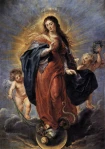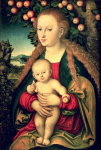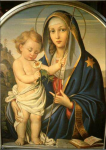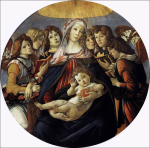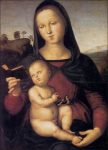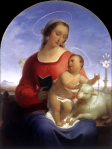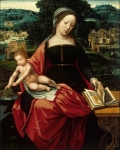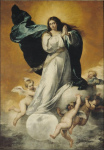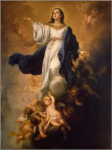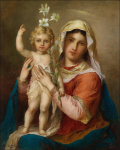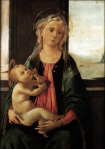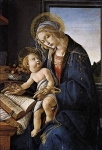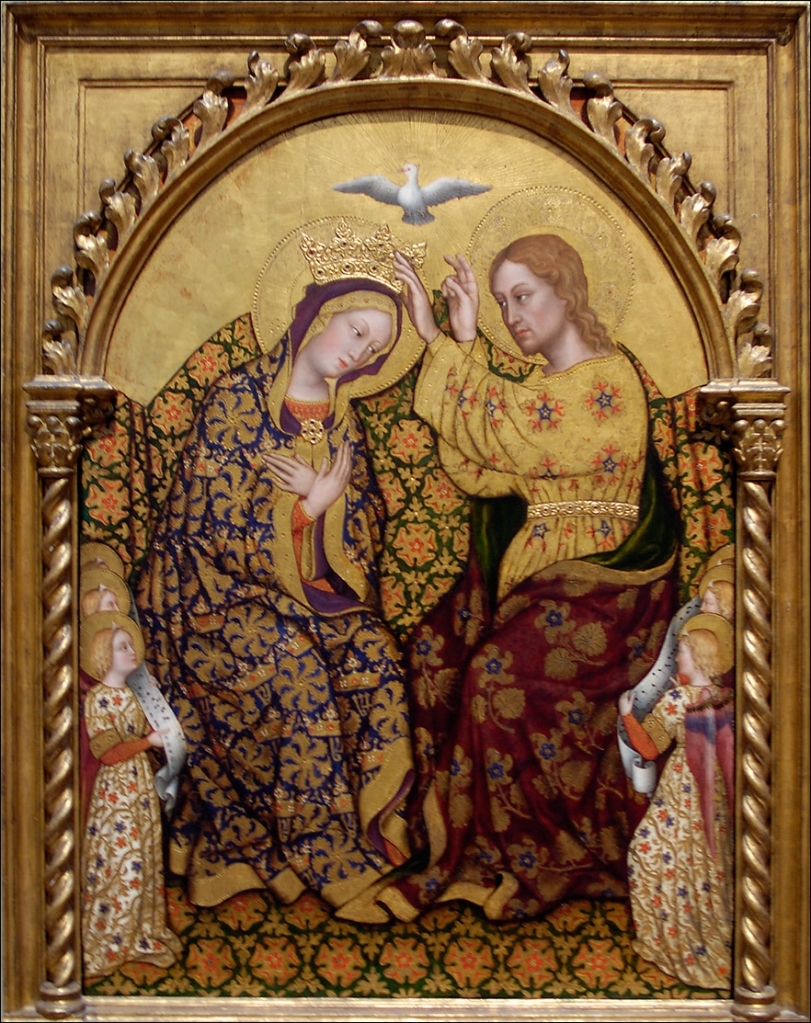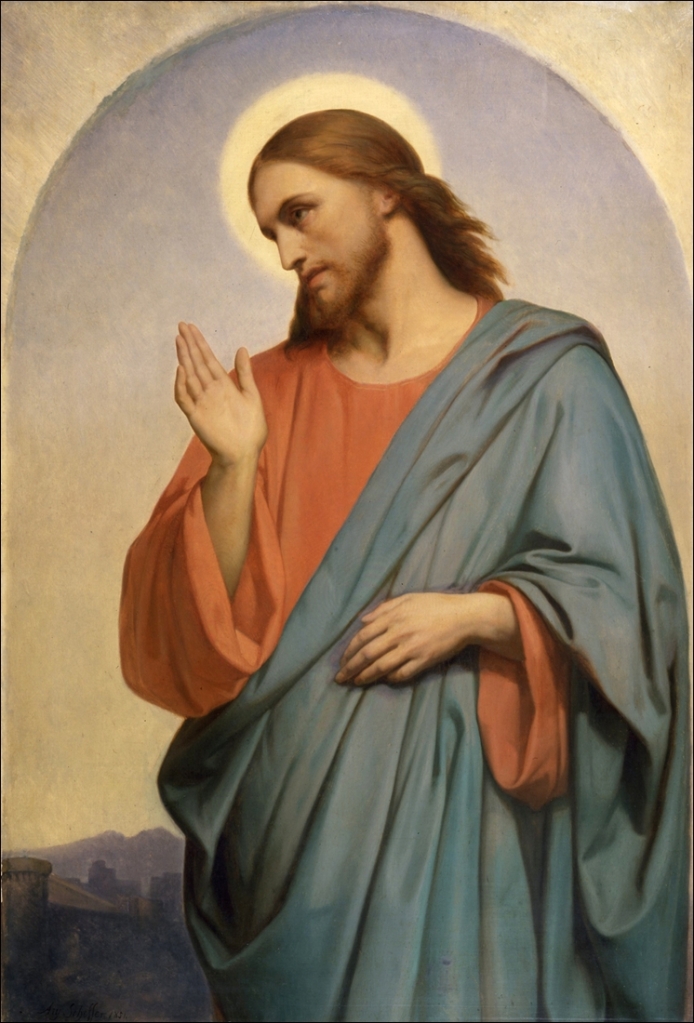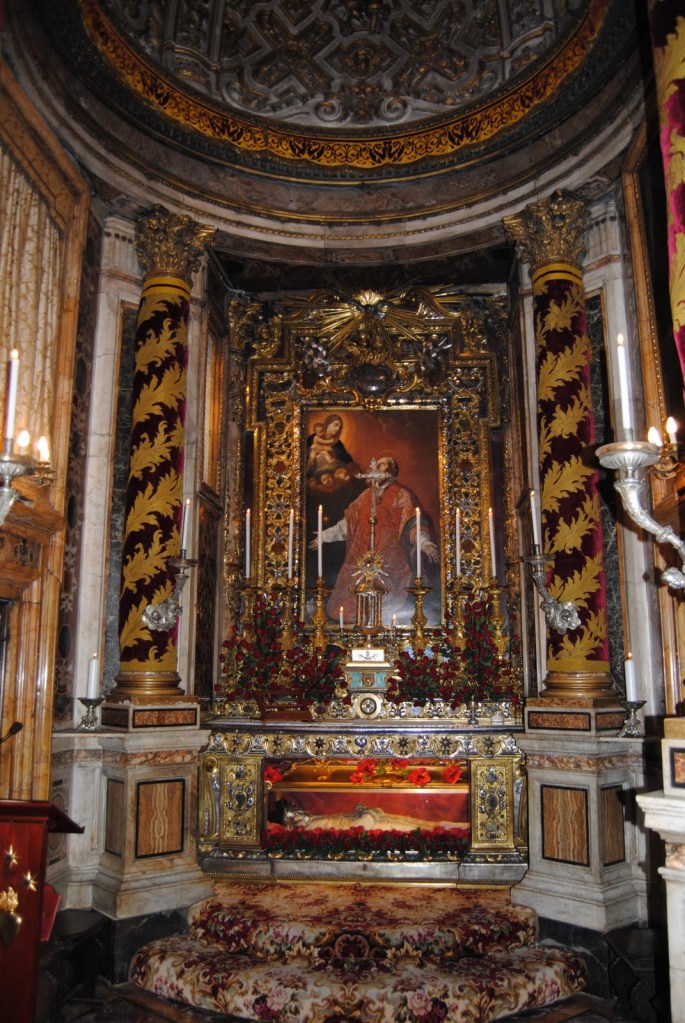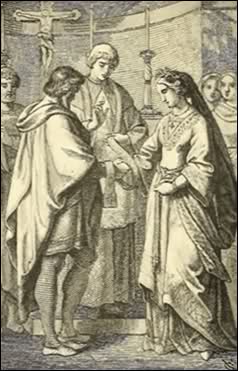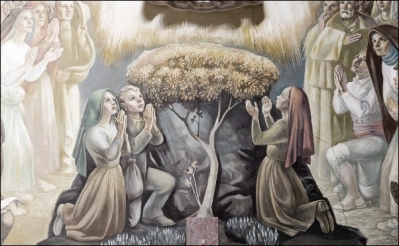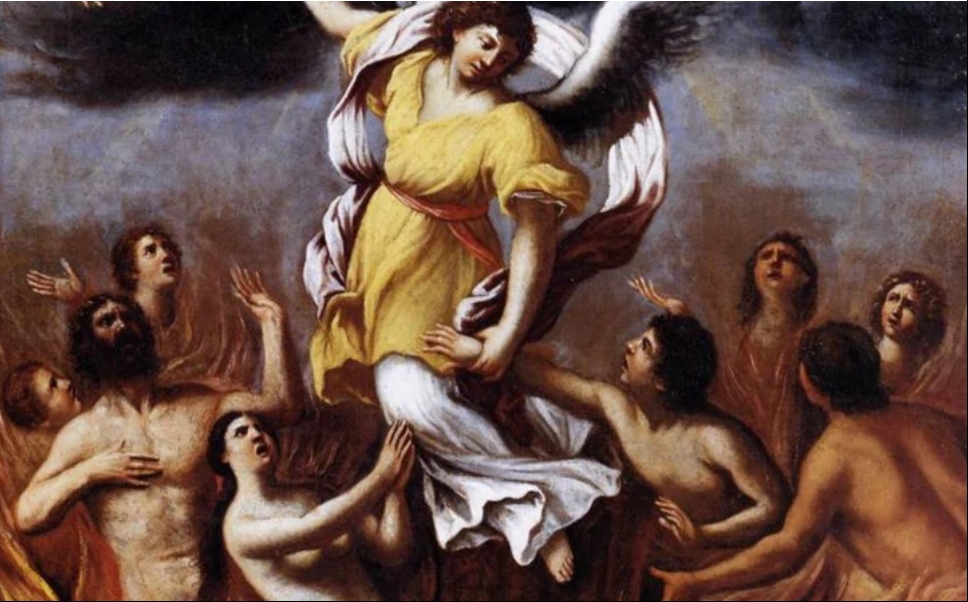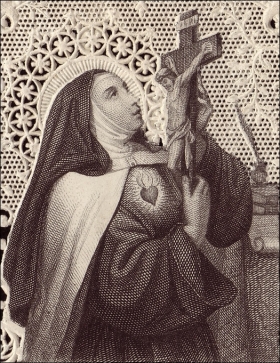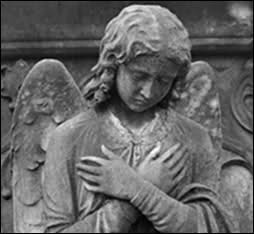Chaplet of Saint Michael the Archangel
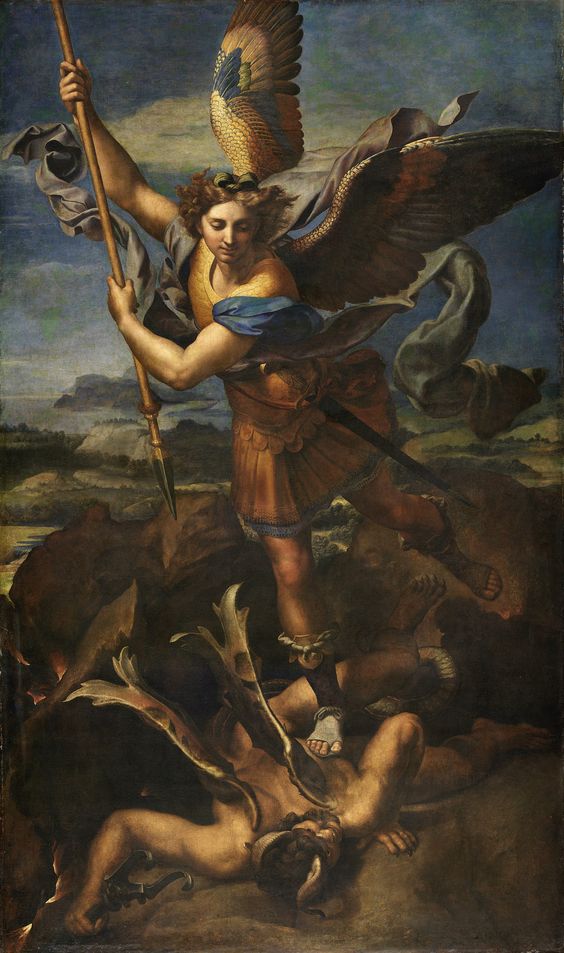
Chaplet of Saint Michael the Archangel Praying the chaplet is said to provide the assistance from Saint Michael the Archangel and the company of one angel from each of the nine celestial choirs when approaching Holy Communion. In addition, for those who would recite the Chaplet daily, he promised his continual assistance and that of all the holy angels during life. Praying the chaplet is also believed gradually to defeat demons and grant a Pure Heart thus, delivering from Purgatory. These blessings extend to the direct family.
The chaplet begins with an Act of Contrition.
Then there are nine salutations, one for each choir of angels, each one followed by an Our Father and three Hail Marys. These are followed by four Our Fathers, honoring Saints Michael, Gabriel, Raphael and the Guardian Angel. The chaplet concludes with a prayer to Saint Michael.
The Archangel Michael promised to whoever would pray this Chaplet:
That he would send a chosen angel from each angelic choir to accompany the devotees at the time of Communion.
To those who recite these nine salutations, every day:
That they will enjoy his continued assistance during this life and also after death, in purgatory. They will be accompanied by all the angels and will be, with all their loved ones and relatives freed from Purgatory.
Pope Pius IX granted the following Indulgences to those who pray the chaplet: Partial indulgence, to those who pray this Chaplet with a contrite heart. Partial indulgence, each day to those who carry the Chaplet with them and/or kiss the medal of the Holy Angels that hangs from it. Full indulgence, to those who pray it once a month, the day they choose, truly contrite and confessed, praying for the intentions of their Holiness. Full indulgence, with the same conditions, in the feasts of the Apparition of St Michael the Archangel (May 8); the feast of the Archangels Michael, Gabriel and Rafael (September 29); and on the day of the Holy Guardian Angels (October 2).
How to Pray the Chaplet of Saint Michael the Archangel
Act of Contrition
O my God, I am heartily sorry for having offended Thee and I detest all my sins because I dread the loss of Heaven and the pains of hell, But most of all because they have offended Thee, my God, Who art all good and deserving of all my love. I firmly resolve, with the help of Thy grace, to confess my sins, to do penance, and to amend my life. Amen.
Sign of the Cross
In the name of the Father, and of the Son, and of the Holy Spirit. Amen.
The chaplet begins with the following invitation: O God, come to my assistance. O Lord, make haste to help me. Glory be to the Father, to the Son, and to the Holy Spirit, as it was in the beginning, is now and will be forever, time without end. Amen.”
(Say one Our Father and three Hail Marys after each of the following nine salutations in honor of the nine Choirs of Angels)
1. By the intercession of St. Michael and the celestial Choir of Seraphim may the Lord make us worthy to burn with the fire of perfect charity. Amen. (Our Father, Three Hail Marys)
2. By the intercession of St. Michael and the celestial Choir of Cherubim may the Lord grant us the grace to leave the ways of sin and run in the paths of Christian perfection. Amen. (Our Father, Three Hail Marys)
3. By the intercession of St. Michael and the celestial Choir of Thrones may the Lord infuse into our hearts a true and sincere spirit of humility. Amen. (Our Father, Three Hail Marys)
4. By the intercession of St. Michael and the celestial Choir of Dominions may the Lord give us grace to govern our senses and overcome any unruly passions. Amen. (Our Father, Three Hail Marys)
5. By the intercession of St. Michael and the celestial Choir of Virtues may the Lord preserve us from evil and falling into temptation. Amen. (Our Father, Three Hail Marys)
6. By the intercession of St. Michael and the celestial Choir of Powers may the Lord protect our souls against the snares and temptations of the devil. Amen. (Our Father, Three Hail Marys)
7. By the intercession of St. Michael and the celestial Choir of Principalities may God fill our souls with a true spirit of obedience. Amen. (Our Father, Three Hail Marys)
8. By the intercession of St. Michael and the celestial Choir of Archangels may the Lord give us perseverance in faith and in all good works in order that we may attain the glory of Heaven. Amen. (Our Father, Three Hail Marys)
9. By the intercession of St. Michael and the celestial Choir of Angels may the Lord grant us to be protected by them in this mortal life and conducted in the life to come to Heaven. Amen. (Our Father, Three Hail Marys)
(Four Our Fathers. One in honor of each of the following leading Angels: St. Michael, St. Gabriel, St. Raphael and our Guardian Angel.)
O glorious prince St. Michael, chief and commander of the heavenly hosts, guardian of souls, vanquisher of rebel spirits, servant in the house of the Divine King and our admirable conductor, you who shine with excellence and superhuman virtue deliver us from all evil, who turn to you with confidence and enable us by your gracious protection to serve God more and more faithfully every day.
Pray for us, O glorious St. Michael, Prince of the Church of Jesus Christ, that we may be made worthy of His promises.
Almighty and Everlasting God, Who, by a prodigy of goodness and a merciful desire for the salvation of all men, has appointed the most glorious Archangel St. Michael Prince of Your Church, make us worthy, we ask You, to be delivered from all our enemies, that none of them may harass us at the hour of death, but that we may be conducted by him into Your Presence. This we ask through the merits of Jesus Christ Our Lord. Amen
O Most Holy Virgin, Mother of our Lord Jesus Christ, Our Lady of La Salette
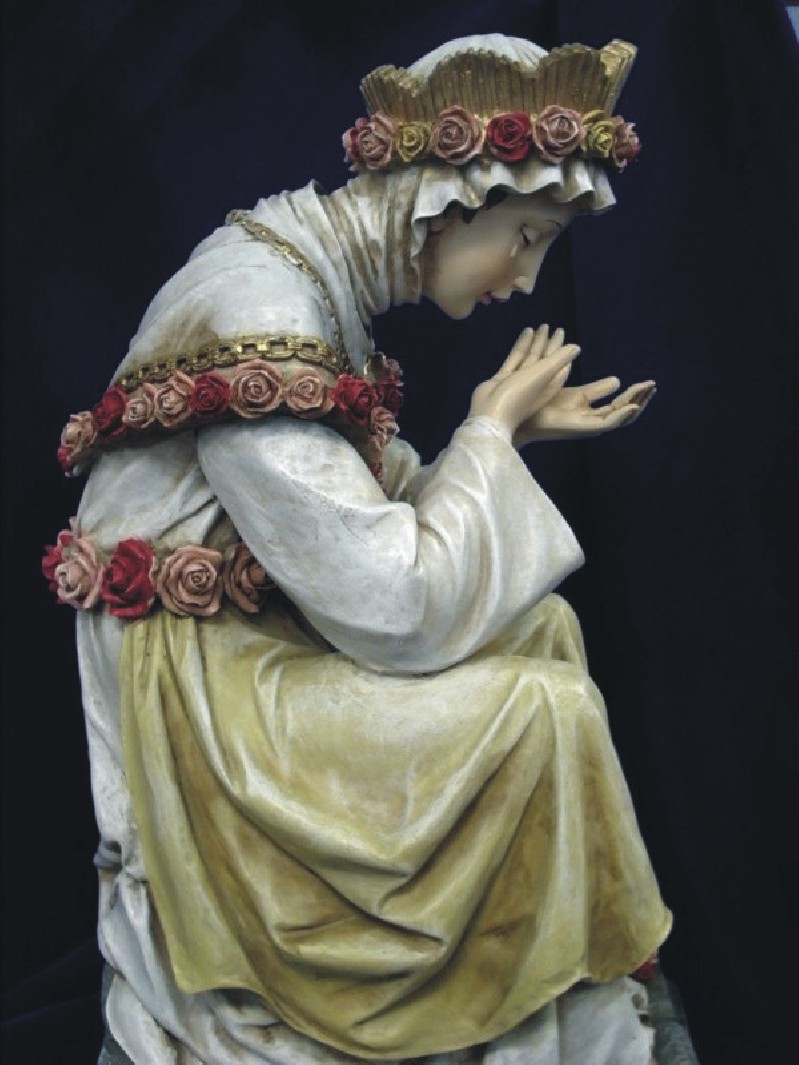
Pray for priests that they may be imitators of thy son, Our Lord Jesus Christ.
Pray that the Lord may send us many holy priests.
Our Lady of La Salette, restore the Holy Church to all things in Christ.
The Immaculate Conception – A Lily Among Thorns
As the lily among thorns, so is my love among the daughters. (Sg:2:2:)
How mighty are God’s works! The word went forth that the human race should be redeemed by the Son of God made man. He was to come unto His own, and His own were to be made ready for His coming. And great was the preparation: the whole world was in peace; the whole Roman world was enrolled, Mary was conceived Immaculate. And this last was the greatest wonder of all!
Adam’s sin betrayed as it were the whole human race to Satan. It handed over to him the vast dominion of this world. Every child of Adam came under Satan’s ban. So much his was every soul, that to belong again to God it had to be repurchased at an infinite price.
Every child but one — Mary, daughter of Joachim and Anna: Mary who was to be Mother of God. She was, through the merits of her Son, without stain from the first moment of her existence. God by a meek maid conquered the rebellious spirit who thought to be as the Most High, and crushed with Mary’s heel the serpent’s head. She was the sole triumph of the four thousand years before her birth and of the two thousand years that followed. Never again shall we see an Immaculate One upon the earth.
If we could only understand what sin is, how we should rejoice in our Lady’s Immaculate Conception. Immaculate, without stain, or spot, or blemish. We are so dull and have grown so callous to sin and its horrors that we almost take it as a matter of course. But indeed sin is not a matter of course, even for the weakest of us. It is one of the devil’s lies to make men believe that sinning is necessary, unavoidable, a part of the present system. Sin is terrible, horrible; disfiguring the soul in this world and torturing it in the next. It is the whole evil of the world, the source of all suffering and misery. And it can be resisted, can be overcome. As a powerful engine makes its way over a rough sea and against a strong wind, so can our will, fortified with grace, overcome the world, the devil, and the flesh. That there are shipwrecks, partial or total, and millions of them, does not take away the possibility of a safe transit.
But why talk of sin today, of all days in the year, when we are celebrating Mary’s spotlessness? Let us rather turn our weary eyes away from that evil to which we are akin and lift them up to rest on Mary. And it is a rest. If there were a spot on earth where we could truly say, “Here no sorrow can come!” how would people flock to that spot.
But there is no such place. Still there is Mary! Hers is a soul where perfect peace and holy joy dwell undisturbed. She was foreshadowed in the Old Testament under the most beautiful types: the dove that could find no spot clean enough for a resting-place; the many-colored rainbow, reaching from heaven to earth and ratifying God’s promise to man; the fiery bush, burning but unconsumed; the majestic cloud of flame that led the Israelites into the Promised Land; Aaron’s rod with its pure white blossom; the Ark of the Covenant, God’s home on earth; Gideon’s fleece, exempt from the common lot; “the garden enclosed” of the Canticle — these and many more were faint symbols of Mary’s soul.
And this beautiful one, God’s Mother, is my Mother too, given to me to be my own. What shall I do to please her? How shall I make much of her? The sight of her radiant beauty turns my thoughts to my own soul, and a sense of shame comes over me. I see there blemishes, imperfections, evil tendencies. Well! let me take them to my Mother and say with the humble saints: “Behold the fruits of my garden.” And Mary will look down with love, and with the tender hand of a Mother will help me to uproot the evil, overcome the bad, and strengthen the good. But perhaps her awful purity keeps me back; I shudder to present before her sinless eyes the sight of my wounded soul. That must not be. Purity never makes the heart hard: the most innocent are the most compassionate. She has never repulsed a sinner because of his frailty.
“Coming to Mary” perhaps sounds vague. It means turning the eyes of one’s soul towards Mary, the Mother of God, and saying to her in the depth of one’s heart some vocal prayer, or, better still, some half-uttered, half-thought-out petition. It means babbling out to the vision in one’s mind one’s troubles, one’s cares, one’s sins, and asking with a firm, strong faith for relief and help. We shall see no beautiful face, no doubt, hear no sweet voice, nor feel a healing touch. But we shall rise from our prayer purified, strengthened, and consoled.
The Manual of the Holy Catholic Church
James J. McGovern
1906
On the 8th of December, 1854, the Vicar of Jesus Christ, our own Pius IX., in the presence of the vast concourse of Catholic Bishops who thronged the Basilica of St. Peter, solemnly defined the Immaculate Conception of Mary to be an article of faith:
“In honor of the most Holy and Undivided Trinity, for the glory and ornament of the Virgin Mother of God, for the exaltation of the Catholic Faith and the spread of the Christian religion, by the authority of our Lord Jesus Christ, of the blessed Apostles Peter and Paul, and by our own, we pronounce and define, that the doctrine, which maintains that the most blessed Virgin Mary, in the first moment of her conception, was, by a singular grace and privilege of Almighty God, in regard of the merits of Christ Jesus, the Saviour of the human race, preserved free from the stain of original sin, has been revealed by God, and is, therefore, to be firmly and constantly believed by all the faithful.”
Ave Maria
Gratia Plena
Symbols and Attributes 0f The Virgin Mary
 The Star often embroidered on the right shoulder of the Virgin’s mantle or in front of her veil refers to the most expressive of her many titles, Stella Maris, “Star of the Sea,” an interpretation of her Jewish name Miriam. Several pictures are called La Madonna della Stella. She is also Stella Matutina, the “Morning Star”; Stella non Erratica, the “Fixed Star”; and Stella Jacobi, the “Star of Jacob.”
The Star often embroidered on the right shoulder of the Virgin’s mantle or in front of her veil refers to the most expressive of her many titles, Stella Maris, “Star of the Sea,” an interpretation of her Jewish name Miriam. Several pictures are called La Madonna della Stella. She is also Stella Matutina, the “Morning Star”; Stella non Erratica, the “Fixed Star”; and Stella Jacobi, the “Star of Jacob.”
The Sun and the Moon. “Who is she that looketh forth as the morning, fair as the morn, clear as the sun” (Solomon’s Song, vi. 10). This text is applied to the Virgin and she is also the woman of the Apocalypse, “A woman clothed with the sun, having the moon under her feet, and on her head a crown of twelve stars.” Hence she is portrayed with the glory of the sun about her, and the crescent moon beneath her feet.
The Enclosed Garden is a symbol borrowed from the Song of Solomon (Cant. iv. 12) as well as a Fountain Sealed, a Well of Living Waters, the Tower of David, the Temple of Solomon, and the City of David.
The Porta Clausa or Closed Gate is taken from Ezekiel (xliv., 2).
The Lily, the Rose. “I am the rose of Sharon, and the lily of the valleys” (Cant. ii., i).
The Palm, the Cypress, and the Olive are all emblems of the Virgin. The first signifies victory, the second points to heaven, and the third denotes peace, abundance, and hope.
The Cedar of Lebanon (“exalted as a cedar in Lebanon”), because of its imperishable nature, its perfume, its healing qualities, and its great height, denotes also the virtue, greatness, and beauty of the Virgin.
The Sealed Book, as a symbol in the hands of the Virgin, refers to the text: “In that book were all my members written”; also to the “book that is sealed which men deliver to one that is learned, saying, Read this, I pray thee: and he saith, I cannot, for it is sealed: And the book is delivered to him that is not learned, saying, Read this, I pray thee: and he saith, I am not learned” (Is. xxix., 11-12).
Besides these symbols, which are mystical and sacred and belong only to the Virgin, there are others of a more general nature that appear in pictures of the Madonna and Child.
The Globe, as the symbol of sovereignty, was early placed in the hands of the divine Infant. When it is under the feet of the Madonna with a serpent twining about it, it is the symbol of redemption.
The Apple, in the hands of the Infant Christ, symbolizes the fall of man; in the hands of the Virgin it indicates that she is the second Eve.
The Serpent is the general emblem of Satan and sin, but it is used in reference to the prophecy, “She shall bruise thy head,” when placed under the feet of the Madonna.
The Pomegranate, the ancient symbol of hope, is often placed in the hands of the Child, who is seen presenting it to His mother.
The Book, when the Madonna holds it open, or has a finger between the leaves, or when the Child is turning the pages, is the Book of Wisdom, and is supposed to be open at the seventh chapter. When clasped or sealed, as before explained, it is a mystical emblem of the Virgin herself.
Birds represent the soul. The Dove is the Holy Spirit hovering about the Virgin. The Seven Doves, typifying the gifts of the Spirit, when they surround the Virgin, characterize her as Mater Sapientia, “Mother of Wisdom.” Doves near her when she is working or reading in the Temple express the meekness and tenderness of her nature.
Certain women of the Old Testament are regarded as especial types of the Virgin, viz.: Eve, Rachel, Ruth, Abishag, Bathsheba, Judith, and Esther, and it is because of this that these Jewish heroines so often appear in religious pictures.
The correct and traditional dress of the Virgin is a blue robe or mantle worn over a close red tunic with long sleeves. In early pictures her head is veiled and the colors are pale and delicate. The enthroned Madonna unveiled was introduced about the end of the fifteenth century.
In the historical pictures she is simply dressed, but in the devotional pictures wherein she is portrayed as the Queen of Heaven, she wears a magnificent crown wrought with jewels interwoven with roses and lilies; her blue robe is richly embroidered with gold and gems, and lined with ermine or stuff of gorgeous colors, carrying out the text: “The king’s daughter is all glorious within; her clothing is of wrought gold. She shall be brought unto the king in raiment of needlework” (Ps. xlv., 13-14).
In the Immaculate Conception and the Assumption, the Virgin wears a white tunic, or white strewn with gold stars. In all subjects that relate to the passion and those that follow the crucifixion she should wear violet or grey. This rule is not always followed, however.
Sacred Symbols in Art
Elizabeth E. Goldsmith
1911
Queen of Thy Servants: Royal Dignity of Those Who Serve Mary
I love them that love me: and they that in the morning early watch for me, shall find me. … He that shall find me, shall find life, and shall have salvation from the Lord. (Prv:8:17,35)
“O lord, for I am thy servant; I am thy servant and the son of thy handmaid.” (Ps:116:16)
To reign such is the ambition of great souls, the stimulus of bold enterprises. But there are two ways of reigning. The first is that of tyrants, who govern with the sword and prevail by violence and wrong. Such a reign is of short duration and the memory of the tyrant is speedily buried in oblivion: “There memory hath perished with a noise.” (Ps:9:6) Others, on the contrary, choose charity for their scepter and humility for their throne. Such a scepter cannot be shattered, and a throne thus founded is never cast down; these are the throne and scepter of Jesus Christ, King of kings, Lord of lords, and Prince over the princes of the earth: “Christ reigns, Christ conquers, Christ commands.” The kingdom of Jesus Christ, founded under the shadow of the cross, strengthened by fierce persecutions, is forever extending: it knows neither ruin nor decay: “Thy kingdom is a kingdom of all ages.” (Ps:145:13)
Now, what is the basis of a kingdom so permanent, of a throne so unshaken? Strange to say, it is none other than the condition of a servant, freely chosen by Jesus Christ: “He took the form of a servant.” (Phil:2:7) Indeed, all that may be procured by ambition and pride is frail and perishable: on the other hand, self-abasement leads to an eternal kingdom, for it is written that “humility goeth before glory.” (Prv:15:33)
Mary reigns with her Son Jesus Christ, and her kingdom, like unto His, is a kingdom of imperishable glory, because hers is a throne of clemency, mercy and pardon: “Hail, holy Queen Mother of Mercy.” And what is the secret of this glorious royalty? None other, but the humble condition of a servant of the Lord: “Behold the handmaid of the Lord; be it done to me according to thy word.” (Lk:1:38)
No sooner had the Blessed Virgin uttered these words, than she commenced her reign, for in that moment she became the Mother of our King: “And the Word was made flesh.” Mary’s sway over the world never diminishes: it ever goes on extending, until it embraces the entire universe.
Happy the servants of the Mother of God! Under the protection of a Queen so kind and powerful, they are not lacking in the necessaries of life; and as for the goods of the soul, they have them over and above, for “all her domestics are clothed with double garments.” (Prv:31:21)
A Christian who is covetous of true and lasting regal splendor, should imitate Mary and faithfully serve the Lord, for He will exalt him to the incomparable dignity of priest and king, according to the words of St. Peter: “You are a chosen generation, a kingly priesthood, a holy nation, a purchased people: that you may declare His virtues, who hath called you out of darkness into His marvelous light.” (1Pt:2:9) But, in order worthily to serve the Lord, we must also learn how to serve Mary: in serving so great a Queen we shall naturally be led to serve God, wherein our greatest dignity consists. To serve Mary is therefore to reign: Servire Maria regnare est.
The reign of one who serves Mary is no tyranny, no reign of oppression and cruelty: it is rather a reign of charity and mercy, directed to alleviating the woes of those who are in affliction. It is a reign of peace, which repays injury by benefit: a reign of humility, which subjects the passions to the yoke of Christ: a splendid and glorious reign, worthy of the ambition of magnanimous minds, the foreshadowing of that eternal kingdom of bliss which is held out to us in heaven.
Oh, if only men knew what a happiness it is to serve Mary, they would contentedly lay aside their wish of ambition and earthly grandeur, and would consecrate themselves, with all the ardor of their souls, to the service of so glorious a Queen.
“Flower Of Paradise”
Considerations On The Litany of The Blessed Virgin Enriched with Examples of the Saints
Very Rev. ALEXIS M.LEPICIER, O.S.M.
1922
And Jesus Wept
It may seem a paradox to call tears the seal of strength and yet when we carefully study the Scriptures we perceive that they have invariably proved one of the most powerful means of obtaining favors and graces from Almighty God. There are of course idle tears—”The tears forgot as soon as shed” the tears of a puerile and vacillating nature, just as there are vain fears, the fears of a weak and cowardly disposition. Yet we know that justifiable fear—the fear of the Lord is the beginning of wisdom, so in like manner we feel we are absolutely right in asserting real soul-stirring tears, tears that rush to the eyes from the depths of a penitent or broken heart- these are the seal of strength.
They appeal with irresistible force from our poor struggling hearts to the loving Heart of our Divine Lord and frequently work miracles by the potent spell of their supreme sanctity.
In the Old Testament we read that Hagar alone in the Desert with her loved and dying son—perishing from hunger, and thirst, and exhaustion, left him under a tree and going a little way cried aloud in her anguish.
“I will not see the boy die: and sitting over-against, she lifted up her voice and wept.”
Then an angel of the Lord appeared to her and showed her a well. It was full of sweet water beside her, but in her despair she had not noticed it until the heavenly messenger said to her.
“Arise, take up the boy, and hold him by the hand: for I will make him a great nation.”
Thus when the world was young God was moved to compassion by the strength of a mother’s grief, and so on from Genesis to the Days of our Saviour we see tears, genuine tears, heartfelt tears, winning blessings and graces, piercing from earth to heaven.
We read that Jacob wept when he believed that his beloved son Joseph was dead, but in His own good time Almighty God restored the lost son to the sorrowing father.
Again Anna, the mother of Samuel. wept because she was childless, and God heard her lamentations and in answer to her tears, although she was advanced in years, gave her the son she longed for.
Then are the fast flowing tears of Job, Job the Prince of Sorrow, and of Jeremiah the Prophet, whose very name is synonymous with tears. We cannot think of him without at the same time thinking of his lamentations: Sedit Jeremias propheta fiens: -the Prophet Jeremiah sat weeping -storming heaven with groans and moans and ceaseless lamentations.
There are several other incidents in the Old Testament of the surpassing power of tears, but it is in the New Testament that they are consecrated and made divine, because Jesus our God and our Saviour Himself shed tears.
Et lacrymatus est Jesus. And Jesus wept. The Gospel does not relate that Jesus smiled or Jesus laughed, it tells us that Jesus wept. Therefore, how blessed and inexpressibly beautiful are tears, whether the salt tears falling from the eyes of the penitent, kneeling like Magdalene at the Feet of Jesus, and like her washing those Sacred Feet with the bitter-sweet water that flowers in a shower of cleansing rain from sorrowful eyes. The tears of Mary Magdalene not only removed from the Feet of her Saviour travel stain and road dust, they at the same time purified her own soul from all stain of sin.
Then the Gospel narrates the pathetic story of the Widow of Nain, it tells of the tears of agony she shed – heartrending despairing tears, but no, not despairing for she trusts in God. Jesus is near, and in answer to her tears and supplications Jesus restores her son to life.
Another example of the marvelous efficacy of tears is the restoration to life of the Daughter of Jairus.
Thus the Gospel narrative tells us of two wonderful miracles worked by Our Lord in answer to tears, but before performing the greatest of all His miracles, He Himself wept.
Annals of St. Joseph, Volumes 31-33
The Norbertine Fathers
1919
The Santo Bambino of the Aracoeli
The sacristan, if asked, will unlock the Shrine of the Santo Bambino, an image of the Holy Child, carved by a Franciscan at Jerusalem in the seventeenth century out of wood taken from the Garden of Olives.
The ship that brought it from Palestine was wrecked at Livorno, but the image was miraculously preserved and brought to Ara Coeli about 1647. It is greatly venerated in Rome, and frequently carried to the sick for their consolation; even miraculous cures are said to have been wrought by it.
The figure is robed in silk and diamonds, and formerly had a carriage of its own, given by Prince Torlonia to convey it to the sick. The blessing given with the Santo Bambino from the head of the marble steps at Christmas time is a great event.
On Christmas day also, after vespers of the Feast of the Epiphany, the miraculous image is carried in solemn procession. An immense crowd gathers on the long flight of steps leading up to the church door and spreads out in the piazza below.
The priest bearing the statue halts at the open space outside the church, which commands a distant view of St. Peter s, and blesses the city with the sacred image; heads are bared and knees bent in reverence to receive the benediction.
A famous crib is made every Christmas at this church; and throughout the octave of the feast children of tender years recite poems of little sermons on a platform in front of it. The infant preachers, whose ages range from four to ten years, go through their task one after another without the slightest embarrassment, emphasizing their words with graceful gestures.
They tell us how they had heard the angels in the early morning, had accompanied the shepherds to the crib, and looked upon the Divine Infant; how they had told the Bambino not to cry, that they would console Him by being good.
There is a tradition that as the great procession of penance directed by St. Gregory the Great (then Pope-elect) in 590 passed through the Forum with the Picture of Our Lady from St. Mary Major, angels were heard singing over the church of Ara Coeli.
The Apparitions and Shrines of Heaven’s Bright Queen in Legend, Poetry and History, Volume 3
William J. Walsh
1904
Read More: Ara Coeli: The Altar of the Heavens for the Santo Bambino
Thanksgiving
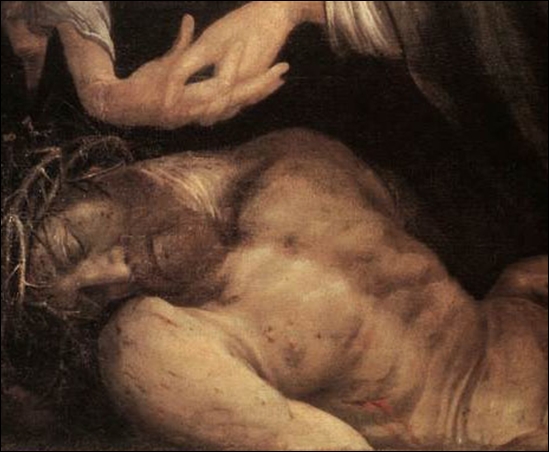
Thine, O Lord, is magnificence, and power, and glory, and victory: and to thee is praise: for all that is in heaven, and in earth, is thine: thine is the kingdom, O Lord, and thou art above all princes.
Thine are riches, and thine is glory, thou hast dominion over all, in thy hand is power and might: in thy hand greatness, and the empire of all things.
Now therefore our God we give thanks to thee, and we praise thy glorious name. 1 Chr:29: 11-13
In All Adversity -Go to Joseph
And when there also they began to be famished, the people cried to Pharao, for food. And he said to them: Go to Joseph: and do all that he shall say to you. (Gn:41:55)
Joseph, the son of the Patriarch Jacob, was the figure of St. Joseph, the son of another Jacob: “Jacob begot Joseph, the husband of Mary, of whom was born Jesus, who is called the Christ. (Mt:1:16)
What was truly said of the first Joseph, as to his future, and as to his goodness, his chastity, his patience, his wisdom, his influence with the king, his power over the people, and his love for his brethren, is verified much more perfectly, even to this day, in the second Joseph.
Of old it was said to the needy and suffering people in the kingdom of Egypt: “Go to Joseph, and do all that he shall say to you.”
The same is now said by the Sovereign Pontiff to all needy and suffering people in the kingdom of the Church—” Go To Joseph.”
If you labor for your bread ; if you have a family to support; if you endure privation and suffering; if your heart is searched by trials at home; if you are assailed by some importunate temptation; if your faith is sorely tested, and your hope seems lost in darkness and disappointment; if you have yet to learn to love and serve Jesus and Mary as you ought, Joseph—the Head of the House, the Husband of Mary, the nursing Father of Jesus—Joseph is your model, your teacher, and your father. Truly, in all things, St. Joseph is the people’s friend.
But who is St. Joseph?
He is the adopted father of the God-man: St. Luke
He is the most faithful coadjutor of the incarnation: St. Bernard
He is one whose office belongs to the order of the hypostatic Union: Suarez
He is the Lord and Master of the Holy Family: St. Bernardine
He is the only one found worthy among men to be the spouse of Mary: St. Gregory
He is the consoler of Mary in her sorrows and trials: St. Bernard
He is the Saviour of the life of the Infant Jesus: .St. Matthew
He is the Saviour of the honor of His Mother: St. Jerome.
He is the man who lived 30 years with Jesus and Mary;
He is the man more beloved by Jesus and Mary than all other creatures: St. Isidore
He is third person of the earthly Trinity: Gerson
He is the model and image of apostolic men: St. Hilary
He is more an angel than a man in conduct: Cornelius Cornelii a Lapide
He is the model of priests and superiors: Albertus Magnus
He is the master of prayer and of the interior life: St. Teresa Lallemant
He is the guardian of chastity, and honor of virginity: St. Augustine
He is the leader in the great procession of the afflicted: Avila
He is the patron of the married state: Paul de Pal
He is the procurator of the Church of God: In parv. off. St. Joseph
He is the patron of a happy death: St. Alphonsus
He is the patron of the Catholic Church: Decree S.C.R
“I took for my Patron and Lord the glorious S. Joseph, and recommended myself earnestly to him. I saw clearly that my Father and Lord delivered me out of this, and other troubles of greater importance, touching my honor and my soul. He rendered me greater services than I knew how to ask for. I cannot call to mind that I have at any time asked him for anything which he has not granted; and I am filled with amazement when I consider the great favors God has granted me through this blessed Saint, and the dangers from which he has delivered me, both of body and soul.
“To other Saints Our Lord seems to have given grace to succor men in some special necessity; but to this glorious Saint, I know it by experience, He has given the grace to help us in all things. Our Lord would have us to understand that as He was subject to Joseph on earth (St. Joseph bearing the title of His father, and being His guardian, could command Him), so now Our Lord in heaven grants all his petitions.
“I have asked others to recommend themselves to S. Joseph* and they too know the same thing by experience.
“I used to keep his feast with all the solemnity I could.
“Would that I could persuade all men to be devout to this glorious Saint; for I know by long experience what blessings he can obtain for us from God. I have never known anyone who was really devout to him, and who honored him by particular services who did not visibly grow more and more in virtue: for he helps in a special way those souls who commend themselves to him. It is now some years since I have always on his feast asked him for something, and I always have it. If the petition be in any way amiss, he directs it aright for my greater good.
“If I were a person who had authority to write, it would be a pleasure to me to be diffusive in speaking most minutely of the graces which this glorious Saint has obtained for me and for others. But I ask for the love of God that he who does not believe me will make the trial for himself—when he will find out by experience the great good that results from commending oneself to this glorious Patriarch and in being devout to him.
“Those who give themselves to prayer should in a special manner always have great devotion to St. Joseph; for I know not how any man can think of the Queen of Angels, during the time that she suffered so much with the Infant Jesus, without giving thanks to Joseph for the services he rendered them then. He who cannot find anyone to teach him how to pray, let him take this glorious Saint for his master, and he will not wander out of the way.”— St. Teresa’s Life, by herself, c. VI.
“Go, then to Joseph, and do all that he shall say to you:”
Go to Joseph, and obey him as Jesus and Mary obeyed him;
Go to Joseph, and speak to him as They spoke to him;
Go to Joseph, and consult him as They consulted him;
Go to Joseph, and honor him as They honored him;
Go to Joseph, and be grateful to him as They were grateful to him;
Go to Joseph, and love him as They loved him, and as They love him still.
However much you love Joseph, your love will always fall short of the extraordinary love which Jesus and Mary bore to him. On the other hand, the love of Joseph necessarily leads us to Jesus and Mary. He was the first Christian to whom it was said, “Take the Child and His Mother.” This led a Father of the Church to say, “You will always find Jesus with Mary and Joseph.”
THE FRANCISCAN ANNALS,
VOLUME II.
Bishop of Salford.
1878
Advice of St Philip Neri To His Spiritual Children
1. Blessed are you, my children, who have time to do good.
2. Now is not the time for sleep; for Paradise was not made for cowards.
3. Children, keep up a cheerful temper. I will have no scruples or melancholy: only avoid sin.
4. Avoid inordinate mirth, because this roots up the little good which has been acquired.
5. You must not leave your devout exercises; but if you wish to recreate yourselves with a walk, let these be fulfilled, and then go.
6. Do not care to attempt too many devotions; but undertake a few, and persevere in them.
7. You must not look to becoming saints in four days, because perfection is acquired with great labor, and by degrees.
8. Do not have a fancy to be masters of spiritual matters and convert others, but attend to regulating yourself.
9. Children, mortify yourselves in small things, that you may afterwards be able the more easily to mortify yourselves in great things.
10. To choose your vocation, time is required, advice, and prayer.
11. To preserve chastity, it is an excellent prescription to discover your thoughts immediately to your confessor.
12. Do not nourish your body delicately; fly bad companions and evil communication.
13. Avoid idleness, especially during the hours after dinner; because it is at that time that the devil commonly makes his fiercest attacks.
14. Do not touch each other familiarly, not even in jest nor have private conversations with each other.
15. Have no familiarity with women, although they may be allied to you by relationship.
16. Do not trust yourselves whatever may be your experience, but fly every occasion.
17. Go often to confession, at least every eight days; and go to communion according to the advice of your confessor.
18. Be devout to Mary, because this is the best means of obtaining the grace of God.
19. Before choosing a confessor, recommend yourselves in prayer to God; but having once chosen, do not readily change without just cause.
20. When at confession, tell your worst sins first, that the devil may not tempt you to end by hiding them.
21. Take counsel always of your spiritual father, and recommend yourselves to the prayers of all.
22. Give yourselves always, and in all things, into the hands of your superiors; because obedience is a compendious way to acquire perfection.
23. Pray continually to the Lord, that He may grant you the gift of perseverance.
24. Endeavor to have God always before your eyes.
25. Never excuse yourselves when corrected; and keep yourselves from saying any thing in your own praise, even in jest.
26. Read, O my children, the lives of the Saints; hear sermons; and do not fail to practice the prayers and other exercises of the congregation; because they are very pleasing to the Divine majesty.
Children, in order not to fall into sin, keep profoundly engraved in your memories the three warnings given by a holy hermit to certain youths, and act according to them faithfully.
1st Warning. Fly the occasions of sin
2nd Warning. Fly the occasions of sin.
3rd Warning. Fly the occasions of sin.
Fly quickly, fly far, fly always.
Children, do you really desire to be saved! Then ever keep,
First, eternity in mind;
Secondly, God in your heart;
Thirdly, the world under your lee.
“This do and thou shalt live.” ( Lk:10:28)
Gate Of Heaven: Way Of The Child Of Mary
A Manual Of Prayers And Instructions,
Compiled From Approved Sources
For The Use Of Young Persons
(1879)
Light Out of Darkness

If mosaics, priceless paintings and imposing statues are conspicuous in grand cathedrals, equally precious in God’s sight are humble wayside shrines. The tradition began in the earliest decades of the Catholic Church with the establishment of markers and small chapels to commemorate Christ. the Blessed Virgin Mary and the martyrs, often at the location of their faithful martyrdom.
Excerpt from “The Legends of The Blessed Virgin” 1853
They who have never visited the towns and villages of a Catholic country, cannot conceive the feeling of delight with which the pious traveler is affected at the sight of those monuments of piety and religious recollection, which, in the shape of crucifixes, images of the Blessed Virgin, and favorite saints, are placed at the angle of streets, in squares, and public places, on bridges, fountains, and obelisks, or between the stalls of a village market or fair. These works of popular art and devotion, formerly existed in great cities also, recalling to the passenger’s mind thoughts of the object and end of his earthly pilgrimage.
They also served a benevolent purpose, and exercised a civilizing influence over the passions of men. Many a pure spring would have been adulterated but for the presence of its presiding saint. Often has the revengeful spirit of an enemy been appeased, when on the point of immolating his victim, by the sight of a man-god suffering for all mankind. The poor soul of some betrayed girl plunged in deep despair and meditating self destruction passes on her way the figure of our Lady of Sorrows, and falling on her knees, obtains comfort and strength from the Mother of Holy Hope and sweet consolation. Again in ancient times cities were but badly lighted and towns not at all. Piety supplied this deficiency. Each statue or holy image had its little lantern which gave honor to the saint and light to the locality.
Some pretended philosophers may sneer at these objects of popular devotion. But have they ever considered the benefits of which they have been the source, the evils they have remedied, the griefs they have calmed and the crimes they have stayed?
Among the cities nearest our shores, Antwerp is one which has most fully preserved this mediaeval custom and contains innumerable pious souvenirs of the ages of faith. Paris was formerly equally distinguished.
“At the comer of every street,” writes the Abbé Orsini, “a little image of Mary rose from amidst a heap of flowers, which the pious people of the neighborhood renewed each morning as soon as the trumpets from the towers of Chatlet announced the break of day. During the night lamps burnt constantly before them illuminating their little grey niches and on Saturdays their number was greatly increased. This was the first attempt to light the streets. A poor illumination, perhaps, when compared to our modem gaslights, yet had it one great advantage over ours for to it was added a pious object, which excited the people to holy reflection.
The silver lights of the Madonna’s shrines shot forth at intervals like a string of stars from their flowery beds, and seemed to say to those who wandered abroad with ill intent, — “There watches over this city, wrapt in slumber, an eye that never closes, but which sees through all our hearts — the eye of God.”
O Beauty Ever Ancient

“He is a true and genuine Catholic, who loves the truth of God, his Church, and its members; who to his religion and his faith prefers nothing—not the authority of any man, not wit, not eloquence, not philosophy: but who, looking down upon these things, and firmly fixed in his belief, resolves to admit, and to adhere only to that, which from ancient times, he knows to have been universally received.”
“Never was it allowed, never is it allowed, never will it be allowed, to deliver any doctrine to the Catholic Christian, that has not been received; and it ever has been, is, and ever will be, a duty to anathematize those who introduce any novelty. Who, therefore, shall dare to preach what he has not received? who shall show himself so easy of belief, as to admit what the Church has not delivered? So taught the great Apostle. But I hear some vain men cry, and cry to Catholics: ‘under our authority, our rule, our exposition, condemn what you held, take up that which you condemned, reject your ancient belief, the doctrines of your Fathers, the institutes of your Elders, and embrace—what ?—I shudder to utter it.”
“Reflecting often on these things, I am astonished at the madness, the impiety, the lust of error in some men, who, not content with the Rule of Faith once delivered and received, are ever seeking for something new, and are ever anxious to add to religion, to change, or to take away; as if, what was once revealed, was not a celestial dogma, but a human institution, which, to be brought to perfection, required constant emendation, or rather correction. If novelty must be shunned, antiquity must be held fast: if novelty be profane, antiquity is sacred.”
Saint Vincent of Lérins ;”Commonitorium” (434)
His Last Great Work -Raphael
 Among the paintings of the Gallery of the Vatican is the Transfiguration, the last painting of Raphael. (1483 – 1520)
Among the paintings of the Gallery of the Vatican is the Transfiguration, the last painting of Raphael. (1483 – 1520)
An almost divine power seemed to have inspired him as he portrayed the history of human suffering, and of the soul’s bright faith of a beautiful home above. Perhaps, as he toiled on, the portals of that home were open to his vision, and the voices of the blessed were stealing around him.
Hence the heavenly radiance which beams from the face, and lingers around the figure of our Holy Saviour. As Raphael eagerly painted and triumphantly gazed upon the realization of his wondrous conception, death snatched him away at the early age of thirty-seven.
Often had I read those touching lines of Rogers, wherein he describes the mournful scene when the dead body was placed beneath that last great painting, whose colors were yet moist from the artist’s brush. All Rome loved him, and Rome poured forth her noblest people to gaze upon the angelic face. The glory around the head of Christ seemed reflected upon the lifeless form. All wept.
“And when all beheld him where he lay, how changed from yesterday—him in that hour cut off, and at his head his last great work;
When, entering in, they looked.
Now on the dead, then on that masterpiece —
Now on his face, lifeless and colorless.
Then on those forms divine that lived and breathed. And would live on for ages—all were moved.
And sighs burst forth and loudest lamentations.” -Samuel Rogers
The intention of the painter is to produce a work, in which the calamities of life should lead the afflicted to look to Heaven for comfort and relief. In the upper part of the composition is Mount Tabor; the three apostles are lying on the ground, unable to bear the supernatural light proceeding from the divinity of Christ, who is floating in the air, accompanied by Moses and Elijah, as a personification of the power of the Lord and the source of Christian consolation.
Below is a representation of the sufferings of humanity: on one side are nine apostles; on the other a crowd of people are bringing to them a boy possessed of a devil. His limbs are fearfully convulsed, and every countenance wears an expression of terror. Two of the apostles point upwards to indicate the only Power by whom he can be cured.
“In the fury of the possessed, in the steady faith of the father, in the affliction of a beautiful and interesting female, and the compassion evinced by the apostles, he has depicted the most pathetic story he ever conceived.” (Luigi Lanzi, Italian art historian -1732-1810)
And yet even all this does not excite our admiration so much as the primary subject on the Mount. There the figures of the two prophets and the three disciples are truly admirable; but still more admirable is that of the Saviour, in which we seem to behold that effulgence of eternal glory, that spiritual lightness, that air of divinity, which will one day bless the eyes of the elect. In the head of the Saviour, on which he lavished all his powers of majesty and beauty, we see at once the last perfection of art and the last work of Raphael.
The Ave Maria
A Journal devoted to the Honor of the Blessed Virgin
1883
“Watch Ye, and Pray”
Then Jesus came with them into a country place which is called Gethsemani. And he said to his disciples: Sit you here, till I go yonder and pray.
And taking with him Peter and the two sons of Zebedee, he began to grow sorrowful and to be sad.
Then he saith to them: My soul is sorrowful even unto death. Stay you here and watch with me.
And going a little further, he fell upon his face, praying and saying: My Father, if it be possible, let this chalice pass from me. Nevertheless, not as I will but as thou wilt.
And he cometh to his disciples and findeth them asleep. And he saith to Peter: What? Could you not watch one hour with me?
Watch ye: and pray that ye enter not into temptation. The spirit indeed is willing, but the flesh is weak.
(Mt:26:36-41)
I had been reading the Passion according to St. Matthew, and as I pondered over the sad words, my whole soul went forth in reproaches against the apostles, Peter, James and John; the three beloved of Christ, upon whom He had lavished blessings innumerable, and whom He had loved with a love surpassing any to be found from the foundation to the consummation of the world.
Oh! how I wished that I had been there, to comfort the Man-God in His misery and sorrow I How sweet would it have been to wait, and watch, and pray, with One who was about to lay down His adorable life for the sins of the world. I thought of Him, as, returning in search of human sympathy to the place where He had left the three — He found them sleeping!
Oh! The unutterable agony of that moment! The utter friendlessness of Christ, alone in the gloom and stillness of that awful night! Nature herself was awed; and the stars trembled beneath their covering of inky clouds. But man alone heeded not. In the distance gleamed the lights in the homes of Jerusalem, but in Gethsemane all was dark.
The bush of death was upon the place, and only once was the silence broken, when the sighing wind bore aloft the immortal plea: ”My Father, if it be possible, let this chalice pass away. Nevertheless, not as I will, but as Thou wilt.” And the softly flowing Cedron caught the echo of the prayer, and swept it down the stream of life to the unborn generations of the children of men. Still the three slept!
I feared; and asked myself, how could this have been? Oh, the frailty of the flesh! the base ingratitude—to desert their Creator—to leave Him comfortless in. His affliction—to sleep while He was in agony! Surely I would not have been as these three; of me would it have been written, ‘one was faithful;’
Even while I sat in meditation, sleep overcame me, as it had done unto those whom I had been condemning. The Testament fell unheeded from my hands; and I dreamt. I was in a church, before the high altar of which burnt a brilliant light, the symbol of that Light, the Light of the world, shut within the tabernacle. But where were the worshippers? the watchers? The church was empty! With a start I awoke, the lesson of my vision branded upon my heart.
Never until now had I realized the meaning of those words of Christ: “Watch ye, and pray.” At last I saw their true significance. Not for the three alone had He intended the divine command; not for those few hours of that night long past; but for all upon whom the light of Christianity would shine: and for as long as there was a Christian soul upon this earth.
Was not Christ here in our world, upon our altars, waiting, longing, entreating for acts of love? And I blushed with shame as I thought of the many times I had passed His church without a thought or care for the patient God within. Christians! Catholics! We need not long to have been in Gethsemani to show our love, nor on Golgotha to show our faith. ‘Tis the present which requires our courage. Our everyday life is full of crosses and trials. May we bear them bravely and visit our Lord in the Sacrament of the Blessed Eucharist. We will never blame Peter, James and John for what we have often done, but what with God’s help, we will do no more.
The Rosary Magazine, Volume 26
January-June
1905
Reflections on The Living Rosary
 “Do you never tire of saying your rosary?”
“Do you never tire of saying your rosary?”
“Never. It is such a comfort to me. I am always finding some new beauty in it. The thought came to me today that the rosary is very like our lives.”
“It is divided into three parts: Joyful, Sorrowful and Glorious mysteries. Do they not correspond to youth, maturity and old age? In youth all things are bright and full of promise: here we have the Annunciation, the Visitation and the Nativity. The first foreboding of sorrow may be found in the Presentation—the prophecy of Simeon—and in losing the Holy Child on the return from Jerusalem; yet when He is found in the temple, the joy far outweighs the pain of loss. So it is in youth; trouble is short lived and is quickly forgotten when the cloud has passed away.”
“The Sorrowful mysteries correspond to the years of maturity, when the cares of life press heavily upon us. Who has not knelt in Gethsemane and cried, with our dear Lord: ‘My Father, if it be possible, let this chalice pass from me!’ And how few of us have the grace to add: ‘Nevertheless, not as I will, but as Thou wilt.’ And how often are we scourged. First by our passions, which are so hard to conquer; by ill-health, by disagreeable companions or uncongenial surroundings. We have all to wear the thorny crown of adversity, when our best, our most prayerful efforts fail to stem the tide which has set in against us. Do we not all have a daily cross, whether some great sorrow or an accumulation of petty trifles it matters not. We struggle on more or less bravely and many times fall beneath its weight. Ah! If we but fasten our sins to the cross and offer our hearts to our crucified Saviour, we will not have lived through the Sorrowful mysteries in vain.”
“The last of the three are the Glorious mysteries. They correspond to old age. The soul that has lived down its passions, thrown off its sinful garment and risen above its human frailties, experiences the sublime grandeur of the Resurrection. Once free and untrammeled, the soul can ascend high enough to receive worthily the gifts of the Holy Ghost. Then may our souls, like the body of our Blessed Mother, be ‘assumed into heaven’ and then —“our crown.”
Extract from The Living Rosary
The Rosary Magazine, Volume 26
January-June 1905
Ave Maria, Gratia Plena
“O Amor Mei Nomen Matris Dei”
“Oh name of the Mother of God, thou art my love.”-St. Anselm
We always see the more a man is for God, the more he appreciates and loves the Hail Mary. I do not know how it is, nor why, but nevertheless I well know that it is true; nor have I any better secret of knowing whether a person is for God than to examine if he loves to say the Hail Mary and the Rosary. I say, “if he loves”, for it can happen that a person for some reason may be unable to say the Rosary, but this does not prevent him from loving it and inspiring others to say it.
O predestinate souls! Slaves of Jesus in Mary! Learn that the Hail Mary is the most beautiful of all prayers after the Our Father. , It is the most perfect compliment which you can make to Mary, because it is the compliment which the Most High sent her by an archangel, in order to gain her heart; and it was so powerful over her heart by the secret charms of which it is so full, that in spite of her profound humility, she gave her consent to the Incarnation of the Word. It is by this compliment also that you will infallibly gain her heart, if you say it as you ought.
The Hail Mary well said, that is, with attention, devotion, and modesty, is, according to the Saints, the enemy of the devil, which puts him to flight, and the hammer which crushes him. It is the sanctification of the soul, the joy of Angels, the melody of the predestinate, the canticle of the New Testament, the pleasure of Mary, and the glory of the Most Holy Trinity. The Hail Mary is a heavenly dew which fertilizes the soul. It is the chaste and loving kiss which we give to Mary. It is a vermilion rose which we present to her; a precious pearl we offer her; a chalice of divine ambrosial nectar which we hold to her. All these are comparisons of the Saints.
I pray you urgently, by the love I bear you in Jesus and Mary, not to content yourselves with saying the Little Corona of the Blessed Virgin, but a whole Chaplet; or even, if you have time, the whole Rosary every day. At the moment of your death, you will bless the day and hour in which you have followed my advice. Having thus sown in the benedictions of Jesus and Mary, you will reap eternal benedictions in heaven: qui seminat in benedictionibus, de benedictionibus et metet.
THE TRUE DEVOTION THE BLESSED VIRGIN.
BY THE VENERABLE SERVANT OF GOD,
ST. LOUIS-MARIE DE MONTFORT
1712
In danger, in difficulty, or in doubt, think on Mary, call on Mary. Let her not be away from thy mouth or from thine heart, and that thou mayest not lack the succor of her prayers, turn not aside from the example of her conversation.
If thou follow her, thou wilt never go astray. If thou pray to her, thou wilt never have need to despair. If thou keep her in mind, thou wilt never wander. If she hold thee, thou wilt never fall. If she lead thee, thou wilt never be weary. If she help thee, thou wilt reach home safe at the last—and so thou wilt prove in thyself how meetly it is said: “And the virgin’s name was Mary.” (St Bernard)
Excerpt from The Roman Breviary for the Feast of the Holy Name of The Blessed Virgin Mary
(Sept. 12)
Disappearance of Men

“Is not ours an age of mislived lives, of unmanned men? Why?… Because Jesus Christ has disappeared. Wherever the people are true Christians, there are men to be found in large numbers, but everywhere and always, if Christianity wilts, the men wilt. Look closely, they are no longer men but shadows of men. Thus, what do you hear on all sides today? The world is dwindling away, for lack of men; the nations are perishing for scarcity of men, for the rareness of men…
“I believe: there are no men where there is no character; there is no character where there are no principles, doctrines, stands taken; there are no stands taken, no doctrines, no principles, where there is no religious faith and, consequently, no religion of society. Do what you will: only from God you will get men.” (Cardinal Louis-Edouard Pie, Bishop of Poitiers, Homily for Christmas 1871)
We are living in the age of wilted men. Men today are bereft of faith and reason, virtue and character, honor and dignity. Men are empty vessels because the enemy has emptied them of the Catholic Faith. Progressivism has cultivated limp daffodils where once were virile men. It has replaced man with a curious species whose voice has been reduced to whimpers and sobs, a character more fitted to caricature than living and fighting against a world surrendering to Satan.
The heroic Bishop of Poitiers, Card. Pie, said that we have “unmanned men” because Jesus Christ has disappeared. Christ has disappeared because He has been shown the door in our society and the Conciliar Church, the wicked institution that claims Catholicity but is instead the diabolical deception resulting from the evils of Vatican II and the progressivist assault preceding it.
C.S. Lewis wrote The Abolition of Man in 1943 during the slaughter of the Second War against Western Civilization. In the chapter, ‘Men without Chests,’ he presciently wrote this, still pertinent today:
“And all the time – such is the tragi-comedy of our situation – we continue to clamor for those very qualities we are rendering impossible. You can hardly open a periodical without coming across the statement that what our civilization needs is more ‘drive’, or dynamism, or self-sacrifice, or ‘creativity’. In a sort of ghastly simplicity, we remove the organ and demand the function. We make men without chests and expect of them virtue and enterprise. We laugh at honor and are shocked to find traitors in our midst. We castrate and bid the geldings be fruitful.”
With this brilliant text, C.S. Lewis met his peer Card. Pie.
In his work Revolution and Counter-Revolution, Prof. Plinio de Correa Oliveira said, “In times of great crisis there are two types of men: those who are overwhelmed by the crisis and those who rise up to resist the trend of events and so change the course of History.”
Our times call for manned men, men with chests, and those who rise to resist events to change the course of History. The Church needs men, the revitalized Church Militant on the move to resist and fight the enemies in the world. Instead, that revolutionary Conciliar Church promotes the Church Groveling, men overwhelmed by crisis, men who promote the crisis. It is a “church” of darkness, a “church” of unmanned men. We need the army of Church Militant to rise against the enemy’s occupation of our Church and society.
But before we return to this matter, let’s look at how we have descended to such a state where men are no longer men.
Feminism vs. patriarchal society
In the 1962 pamphlet What’s Become of Father? Catholic scholar John O’Brien reports that the “problem” of the father and his role was troublesome even then. We mistakenly think of the ‘50s and ‘60s nostalgically as “good” times for the Church, the family and men. He is wrong. The assault against all three was already in full swing.
O’Brien wrote: “Time was when father was the revered head of the household, to whom the children turned for guidance in all important decisions; he was respected for his wisdom and experience, and loved for his devotion to his family. No event in the home was complete without his presence.” Such a vaunted position in the natural order of the family drove the fringe element of feminism into a ravening rage.
These harridans screamed in the streets, sharpening their tongues and knives, then went after men with a vengeance. They hated the “patriarchal” society. They vowed to destroy it. With millions of dollars pumped into academic programs called “Women’s Studies” in the nation’s colleges and universities, feminists rose to dominance. These “studies” were funded in great measure by the Rockefeller Foundation.
With the rise of feminism and women in the workplace, many women lost their natural loving instincts. Consequently, the family fell into disarray, morals declined and birth rates plummeted.” O’Brien suggests this is the case because, even in 1962, “the child’s chief, if not his only parent, is the mother, while the father is relegated to the position of a mere breadwinner.” Since then the father has ceased even to be the breadwinner and has become merely an inconsequential oaf, as countless advertising spots remind us.
Already in the early 1960s, commentators remarked on the father’s haplessness. Dr. O’Brien cites research affirming how modern culture set the woman up as a beautiful powerhouse of sex appeal and dynamic capability, relegating the male to a position of ridicule as an awkward and hapless galoot.
Reflecting the feminist vision of the male, the popular soap operas of that time pictured men as “simple-minded, easily-bamboozled and fairly expendable oafs.” In the halcyon days of television sit coms in the late ‘50s and early ‘60s, the trend toward oafishness began with Dick van Dyke’s character of Rob Petrie in The Dick van Dyke Show.
As society continued its unabated descent into filth and despair, more “fathers” appeared on the television horizon. Some fathers were still portrayed as adequate, The Andy Griffith Show and The Courtship of Eddie’s Father being two examples of note. But families were changing significantly with wives as co-breadwinners, usually in high powered jobs, like Claire Huxtable in The Cosby Show, where she was an attorney and he, Cliff Huxtable, a pediatrician working from the basement in his home.
The descent of the father continued with Home Improvement, showcasing Tim Allen as a ridiculous handy man wannabee who ran an unsuccessful cable network show. Allen was saved continually by his wife. If it were not for her, the show implied, Taylor and his three sons would be living in filth, reeking of perpetual body odor, wearing cardboard boxes for shoes and garbage bags as clothes.
In Home Improvement the mother’s true role as her husband’s helpmate and “sun of the family” has become a caricature. Men are seen as pigs that need women to clean them up and boss them around. That reinforces the twisted feminized view.
Anyone who watches sit coms today can see that this early tendency to present men as big boys and fools has continued and exacerbated without restraints.
There is no doubt that the great majority of modern men have been hermetically sealed in the baggie of feminism. Nearly all are too timid and fretful to break free to demand their natural authority as men and as heads of households.
Abandoning comforts and entering the battle
For the Church, true men are vital for her restoration. Sadly, even traditional Catholic men have been too inculturated by the filth of Progressivism. Men have become weak and ineffectual.
We must remember the words of Job, (7.i), “the life of man upon earth is a warfare.” We are seduced by comfort and consumption, beset by economic woes and the vagaries of antichrists in politics.
This is not the hour to abandon the Mystical Body of Christ to its enemies and run off to some solitary forest to avoid personal inconveniences. This is the hour to enter the battle with increased vigor, to re-conquer every inch of soil the enemies took and rebuild in that place the same sacred institution more militant, pure and glorious than ever, so that the Church will be ready to face, under the protection of Our Lady, all other possible enemies until the end times.
St. Bernard roused the men of his time to enlist in the Second Crusade with stirring words: “All you who hear me, make haste to calm the wrath of Heaven! Leave off imploring His goodness with futile lamentations or mortifying yourself with disciplines, but rather take up your invincible shields. The clamor of arms, the dangers, difficulties and fatigues of war, these are the penances that God imposes on you.”
We should pay heed to them in our continuing crusade to storm the captured citadel and free the imprisoned Truth. We Catholics can still be the great men needed for our times. We must go into the world, in all domains, to battle for Holy Church and her dignity. We must recapture that which has been taken, defend those assaulted, and restore to God His rights.
What a horrible thing it would be if we, as Catholic men, dropped our arms and fled the battlefield. Then, to end with the words of the heroic Card. Pie, “What a disappointment for mothers to realize that the male they gave birth to is not a man, and will never deserve to be called a man!” We are Catholic men or we are nothing.
Mater Dolorosa — Weep ’til Death and Weep with Thee
“O all ye that pass by the way, attend, and see if there be any sorrow like to my sorrow. (Lamentations 1:12)
A dutiful child is never unmindful of the sorrows of his mother. Her sighs and labors are ever deeply imprinted on his memory, and he is bent on fulfilling that sacred command of Heaven which venerable Tobias gave to his faithful son: — ” Thou must- be mindful what and how great were the perils which thy mother suffered for thee;” and which Ecclesiasticus, inspired by the Holy Ghost, gives to all mankind, in these words: “Forget not the groanings of thy mother.”
As Christians, we are all children of Mary. She became our Mother amidst unutterable anguish and pain. She was solemnly declared our Mother when standing at the foot of the Cross, whilst the blood flowed in streams from the wounds of her dying Jesus.
For our loving Redeemer, being about to leave this world, and pitying our orphan state, addressed every Christian, in the person of St. John, his beloved disciple — ” Behold thy Mother : ” then, turning his bleeding head towards the Blessed Virgin, He said, as the same Evangelist testifies — “Woman behold thy Son.” We, therefore, are the children of Mary: Jesus has declared us such.
“As Christ has begotten us,” says St. Antonius,” to a spiritual life, in the word of truth, by suffering on the cross, so, likewise, Mary has begotten us, and brought us forth in the midst of most acute pains, by sharing in the sufferings of the crucifixion of her Son.” Ah, then, never let us forget her sighs and groans —her bitter pains and sorrows. Deeply should we fix them in our memory, and day after day call them to mind.
“Forget not the groanings of thy Mother, and be mindful what and how great were the perils which she suffered for thee.” Meditate often on the sorrows of Mary and you will imitate her virtues, share in her merits, and obtain her special protection.
But that you may be still more encouraged to think of the Seven Dolours, be reminded of some other advantages which you will gain from this most beautiful and consoling devotion.
It was revealed to St. Elizabeth, a Benedictine nun, that our Lord will bestow four graces on those who are devout to the sorrows of the Blessed Virgin. First, that whoever invokes her by her Dolours, shall obtain the grace of true repentance. Secondly, that she will console such in all their tribulations, and especially at the hour of death. Thirdly, that the Lord will imprint on their minds a remembrance of his Passion, and inspire them with great devotion to it. Lastly, that He has empowered Mary to obtain for them whatever blessings she pleases.
Of this we are certain, that in proportion as we, the servants of Mary, compassionate her sufferings and meditate on her great sorrows, while thus our love for her grows daily “more and more,” so also will our love for Jesus crucified still more continually increase.
Private devotions will multiply, public offices will be more regularly and more devoutly attended, and, as we confidently believe, Mary will show us a grateful love, and, with her own most marvelous blessing, will bless those who, by compassionating her Sorrows, show themselves the most truly to be her children, and give the sweetest consolation to her afflicted heart.
First Dolour
Prophecy of Simeon
“Tuam ipsius animam pertransibit gladius.” “And thy own soul a sword shall pierce.” —St. Luke ii.
Second Dolour
The Flight into Egypt
“Surge, et accipe Puerum, et matrem Ejus; et fuge in Aegyptum.” “Arise, and take the Child and His mother, and fly into Egypt.” —St. Matt. ii.
Third Dolour
The Loss of Jesus in the Temple
“Fili, quid fecisti nobis sic? Ecce pater Tuus et ego dolentes qucerebamus Te.” “Son, why hast thou done so to us? Behold, Thy Father and I have sought Thee sorrowing.”— St. Luke ii.
Fourth Dolour
The Meeting with Our Lord on Calvary
“Sequebatur autem Ilium multa turba populi, et mulierum quae plangebant et lamentabantur eum.”
“And there followed Him a great multitude of people and of women who bewailed and lamented Him.”—St. Luke xxiii. .
Fifth Dolour
The Crucifixion
“Ibi crucifixerunt Eum.” …” Stabat autem juxta Crucem Jesu Mater Ejus.” . . . “Where they crucified Him.”…” Now there stood by the Cross of Jesus, His Mother.”— St. John xix,, 18, 25
Sixth Dolor
Jesus is Taken Down from the Cross
“Et accepto Corpore, Joseph involvit Illud in sindone munda” …” And Joseph, taking the Body, wrapt it up in a clean linen cloth.”—St. Matt, xxvii.
Seventh Dolour
Jesus is Laid in the Sepulchre
“Involvit sindone el posuit Eum in monumento.” ...” And Joseph wrapped him up in the fine linen, and laid Him in a sepulchre.” —St. Mark xv.
“Manual of Devotions in Honour of the Seven Dolours of the Virgin Mary”
Father Sebastion
1868
For the Relief and Ransom of The Suffering Souls
It is therefore a holy and wholesome thought to pray for the dead, that they may be loosed from sins
(2 Mac 12:46)
Devout Christian, do you wish for favors from God? Be very compassionate to the souls in purgatory. That charity which you have shown to them, God will show much more to you.
Be compassionate to them, not in heart only, but by works, and by every sort of suffrage; by prayers, alms according to your power, by mortifications and pious exercises; above all, by the application of holy indulgences, and by hearing Mass, or getting it celebrated in relief of these poor and much afflicted souls.
Endeavour, O Christian, to suffragate them with generosity of heart; and then in your own necessities, spiritual and temporal too, you will obtain of God, your kind Father, whatever you wish. If you do so, beloved brother, be sure that you will be amply rewarded’ in this life, and much more in the life to come. St. Catherine of Bologna, when she wished for any favors, had recourse to the souls in purgatory, and forthwith she found her prayer heard.
Do you, then, succor these holy souls, and God will hear your prayers, and will be your help. Do, then, enter into this pious association, the whole business of which is to show compassion to these blessed souls, not in heart only, but also by good works, and every kind of suffrages. God, who loves them dearly, will abundantly reward your charity, and will bless you in life, and at the hour of death. The grace of the Lord be with you evermore!
Any one that has a mind to join this pious association has only to determine so to do with himself, and before God, without any form or external compact: it will be enough to form the intention of uniting in spirit in the works and prayers of all the other faithful who have joined it for the same object, if you fulfill the following obligations:
1. Let every associate endeavor, as much as in him lies, to find some one else who will enroll himself in his spiritual society; and this can be done either by word of mouth, or by getting copies of this sheet, in order to obtain a continually increasing number of people, who endeavor by good works and fervent prayers to give suffrages to the holy souls in purgatory. The associates may belong to either sex.
2. Every associate will recite every day, as a suffrage for these holy souls, a prayer of his own selection which has some indulgence annexed to it, or will hear a Mass, or do some other good work, as, for instance, an act of abnegation of his own will, or mortification of his appetite, or eyes, or by fleeing from some dangerous occasion, or by the practice of any other virtue.
3. Every month, too, each associate will go to confession and communion, praying for the dead who belonged to the society. The charity due to all the dead is much more due to those of the confraternity, who have passed into another life.
Purgatory Opened To The Piety of the Faithful: or The Month of November Consecrated to the Relief of the Souls in Purgatory
1859
As a reminder of our duty to pray for the suffering faithful in Purgatory, the Church has dedicated the entire month of November to the Holy Souls. Every Catholic should make some extraordinary effort to join with the spirit of the Church this month to do what he can for the alleviation of the torments of purgatory.
Our intercession for the suffering now will enlist their intercession in our behalf from their place in heaven hereafter. Truly may we say that in a manner the souls in purgatory are our captives, for their release in a great measure devolves on us. We may liken them to Lazarus begging crumbs from the rich man’s table; they are imploring our aid, so let us in our generosity and from the charity of our hearts lend them every possible assistance.
Of the various forms of prayer, kinds of mortification, and acts of piety that may be performed for the atonement of the sins of the suffering, no prayer or deed can be more salutary, at once more simple or more effective, than the beautiful prayer adaptable to all necessities, the prayer of the Rosary.
Another exercise of charity would be to remember all of your family and loved ones that have died by enrolling them in The Rorate Caeli Purgatorial Society. By doing this for them, you ensure that they will have 42 holy priests and numerous laymen saying Traditional Latin Masses, and countless prayers for the repose of their souls. No stipend is required for this act of charity, but you can always pay it forward by supporting any good Christian cause.
Suffer the Little Children to Come unto Me
All good men love little children. There is something in them that recalls the presence of God, a freshness and innocence which is the mark of His creative hand before sin has marred and almost obliterated it.
Our Lord more than once showed the love of His Sacred Heart for children. When a crowd of women came with their little ones begging Him to bless them, and the disciples tried to push them aside, Jesus interposed: “Suffer the little children to come to Me.” And then He called them one by one and blessed each one, and laid upon each His sacred Hands. What graces must have flowed into the hearts of those favored children! We should pray for all the little ones whom we love, that our Lord may in like manner bless them.
On another occasion, when the children shouted to Him in childish glee: “Blessed is He that comes in the name of the Lord!” the Pharisees begged Him to silence them. But Jesus rebuked the objection almost sternly: “Have you never read, Out of the mouths of infants and sucklings Thou hast perfected praise?” (Mt:21:16) Perfected praise! As if there was something in their innocent voices sweeter to Him than in any others of the mingled crowd.
But Jesus bestowed still higher praise on the sweet simplicity of children. He told His disciples that if they wish to enter the Kingdom of Heaven they must become like little children, docile, obedient, cheerful, submissive, and affectionate. (Mk:10:15)
Beautiful Pearls of Catholic Truth, Containing the Teachings of the Holy Catholic Church
Rev. Bernard O’Reilly
1897
Trials and Tribulations: Catholics Persevere in China
In all things we suffer tribulation: but are not distressed. We are straitened: but are not destitute.
We suffer persecution: but are not forsaken. We are cast down: but we perish not.
Always bearing about in our body the mortification of Jesus, that the life also of Jesus may be made manifest in our bodies.
For we who live are always delivered unto death for Jesus’ sake: that the life also of Jesus may be made manifest in our mortal flesh. (2Cor:4:8-11)
Sixty-five years of Chinese communist rule should be mourned, not celebrated. Contrary to the media-fueled image of Mao as a gentle philosopher and great freedom fighter, he was actually a degenerate mass murderer who ruthlessly suppressed all human rights. In their remarkable biography, Mao: The Unknown Story, Jung Chang and Jon Halliday revealed that Mao grew up not as an oppressed hard working peasant dedicated to fighting injustice, but as a loafer who took a job as a Communist International Soviet agent to receive “a comfortable berth as a subsidized professional revolutionary.”
Mao enthusiastically adopted Lenin’s most violent terrorist techniques because he was a vile bloodthirsty thug. From 1920 to 1976 Mao murdered more people than Hitler and Stalin combined – 70-million Chinese. The “Great Famine” (1958-1961) in which 40-million perished was a direct result of Mao’s farm collectivization policies. To eliminate tens of millions of imagined enemies he ordered the “Great Leap Forward” (1958) and the “Cultural Revolution” (1966-1968) which he privately referred to as the “Great Purge.”
Mao attempted to control every form of social intercourse. Merely having a dinner party, use of humor or sarcasm could be – and were – deemed criminal activities that warranted the death penalty. And he was proud of these policies: Mao told his fellow gangsters at the 1958 party conference that they should welcome, not fear, party policies that cause people to die.
Mao ruthlessly suppressed centuries-old Catholic missions. His persecution of Catholics began long before he took over the government in 1949. In the 1920s, 30s, and 40s, Mao’s Red armies roamed through Chinese provinces torturing and murdering scores of priests and nuns. In 1947, for instance, eighteen Cistercian monks at Yang Kia Ping were jailed and their monastery was looted. All died from endless interrogations, beatings, and brainwashing.
The Red Chinese were not content with suppressing the Church. They dumped Catholics into re-education camps and used harsh psychological measures that included physical and mental torture to convert them to Marxism. If the education treatments failed, it was hoped that recalcitrant pupils would go mad or commit suicide.
In recent decades, the Communists continued to persecute China’s 5-million Catholics. After the 1989 anti-government demonstrations in Tiananmen Square, there were crackdowns on the underground Church. “House Churches” were destroyed and priests were arrested. Also, Catholic women were forced to have abortions or were sterilized to comply with China’s “one-child policy.”
In May 2007, Pope Benedict XVI released a letter to the Catholics of China which dealt with the relationship between Church and State. The pontiff reaffirmed there was only one Church which included both the unofficial underground one and the government-recognized Patriotic Catholic Church. He respectfully called for religious freedom and constructive dialogue to overcome disagreements.
The pope’s pleas appear to have fallen on deaf ears. Priests and bishops are still imprisoned and the faithful continue to be physically abused by government officials.
In May 2008, on the feast of Our Lady, Help of Christians, Pope Benedict held a worldwide day of prayer for the Church in China. However, Chinese Catholic pilgrims, who travelled to Mary Helper of Christians Shrine near Shanghai to participate in the day of prayer, were denied access to the consecrated grounds by the police.
America’s elitist intellectual and political classes have a distorted view of today’s China. Contrary to their revisionist claims, China’s people still lack basic freedoms and their state-run economic system is built on the graves of millions of victims of Mao’s depravity.
http://www.thecatholicthing.org/columns/2009/sixty-years-of-maoism.html
See More photos: On the road, the Catholic Church in China by Lu Nan
Decorum in a Catholic Church
How awesome is this place! This is no other but the house of God, and the gate of heaven. (Gn:28:17)
When you enter the church, go to your place as quietly as possible. Some people make a great deal of noise in getting to their seats. This is calculated to disturb the congregation, and is exceedingly unbecoming. The church is the temple of the living God, not merely because it is dedicated to his service, but because he dwells therein.
The very walls of it are sanctified. It is at all times holy and is therefore always to be entered with the respect due to the house of God. “The Lord is in his holy temple; let all the earth keep silence before him.” Do not walk up the aisles with an air of pride, such as the people of the world may put on in a ballroom. You may be regarded by the world as rich, intelligent, and accomplished; in the church, you are a poor, blind, and sinful being, and should come in all humility to implore the grace and mercy of God.
It is still more necessary to observe these rules, if you enter the church after Mass has commenced. If you happen to enter during the elevation or communion, kneel by the door, and remain there during those more solemn parts of the Mass; you can afterwards retire quietly to your place.
You should assist with attention at the holy Sacrifice. When you are not reading your prayer-book, keep your eyes fixed on the altar on which that adorable Sacrifice is offered, and never gaze around in the church.
Do not leave the church until the priest is retiring from the altar to the sacristy. Those who are the last to come to it, and the first to rush out of the church, seldom derive any benefit from Mass, and often do not hear it properly. The practice of all pious Catholics is, to spend some time after Mass in thanksgiving.
Do not remain standing before the church, as if you had no other object in coming than to see and be seen. If you have time before Mass, say the Rosary, the Stations of the Cross; employ the time in spiritual reading, or in adoring Jesus Christ in the Blessed Sacrament.
Remember what those who have gone before you in the faith endured that they might be present at the holy Sacrifice of the Mass, and reflect with what attention and piety they must have assisted at it. During the early persecutions, no churches could be built. The divine mysteries could not be celebrated anywhere in public. The faithful were compelled to go into subterranean vaults, called catacombs, where Mass was offered on the tombs of the martyrs. The candles we burn on our altars remind us of those days, and of the brightness of faith that made them days, not of mourning, but of joy.
To assist properly at Mass is one of the most important acts of the Christian life; and hence the Church declares it to be a mortal sin to neglect to hear Mass on Sundays or Holydays.
St. Joseph Manual:A Selection of Prayers For Public and Private Devotion
With Epistles and Gospels For Sundays and Holydays
Compiled From Approved Sources
Rev. James Fitton
1877
Mary, The Health of The Sick
The sin of our first parents not only deprived man of original justice and of all the gifts consequent thereon; it reduced him furthermore to a state of great weakness, so that it is impossible for us to accomplish works of supernatural value, without a special grace. Fallen man is like one sick, who has no relish for any nourishment whatever. He is deficient in vital energy, and his actions are wanting in that vigor which naturally belongs to a healthy person. He is strongly inclined to vice, and finds the practice of virtue tedious and difficult.
This natural incapacity regarding the performance of good works is further increased by actual sin, whether mortal or venial. The former, by depriving the soul of divine grace, which is the principle of spiritual life, hinders man from doing anything pleasing to God, so as to merit eternal happiness. The latter, by diminishing the fervor of charity, makes the practice of virtue laborious, since charity has for its effect precisely to facilitate the performance of what is good. Sin is therefore a great evil, because, if mortal, it saps altogether the spiritual energy of the soul, and if venial, it notably weakens it. If from individuals we pass on to nations, we perceive that sin, like a subtle poison, eats into the heart of them, weakening and preparing their ruin.
Divine bounty, which for bodily ailments, has procured us efficacious remedies, is not less industrious in providing the means to heal our spiritual maladies. With the sacraments instituted by Jesus Christ to restore our souls to grace or to augment it within us, God has also been pleased to grant us, in Mary’s aid, a potent remedy for our spiritual infirmities. In fact, Mary has not only given us Jesus Christ, the Pastor and Physician of our souls, but furthermore, she watches over us as a tender mother does by the cradle of an ailing child.
Besides this, Mary’s example encourages us in our conflict with the devil. For she is the Immaculate Virgin, who never was defiled by sin. Her sweet soul was always filled with the perfume of the noblest virtues.
Mary never ceases also to hearken to the voice of our supplications and to present them before the throne of God, often anticipating our requests, and obtaining for us, through her own merits and those of Jesus Christ, all the helps necessary to us in our spiritual needs.
And what Mary does for individuals, she also does for whole nations. As a pitiful Queen, she succors them in their distress; she raises them from their bed of sickness, and is for them a bulwark of defense. (Sg:8:10)
Mary’s power and motherly care not only embrace spiritual miseries: they also extend to the ills of the body. How often do we see Mary restoring health to the sick, who have recourse to her with filial confidence!
In Mary’s readiness to alleviate bodily ailments, shines forth most splendidly God’s love for her. It seems as if the Most High had placed no limit to the efficacy of His Mother’s intercession. While other saints are invoked only in particular cases of corporal infirmity, Mary’s power, on the other hand, is exercised over every kind of malady. Hence we may say that, at her word, as once at the word of Jesus, the blind see, the lame walk, the lepers are cleansed, and the deaf hear. (Mt:11:5) The sole difference is that Jesus Christ, being God, wrought these miracles of his own personal authority, while Mary obtains for us, of the Divine Clemency, the graces she asks, by virtue of the efficacy of her intercession with God.
However, though Mary is so powerful in healing all bodily ailments, yet she does not always deliver her clients from every such trial, because God sees best to exercise them in patience, that they may thereby win the reward prepared for them in heaven. But when Mary does not restore bodily health, yet, for all that, she never ceases to act the part of a tender Mother toward us, watching over us, and obtaining for us, in place of bodily strength, resignation to the divine will and interior peace: two sovereign means of sanctification and salvation.
O Mary, Immaculate Virgin, our salvation lies in thy hands. Cleanse our souls, we beseech thee, from the leprosy of sin, and assist us in our corporal infirmities. And if it be the will of God that we must be acquainted with sickness and suffering, obtain for us, at least, perfect patience and resignation in whatsoever God may dispose. Amen.
FLOWER OF PARADISE
-CONSIDERATIONS ON THE LITANY OF THE BLESSED VIRGIN, ENRICHED WITH EXAMPLES DRAWN
FROM THE LIVES OF THE SAINTS
Very Rev. Alexis M. Lepicier, O.S.M.
1922


